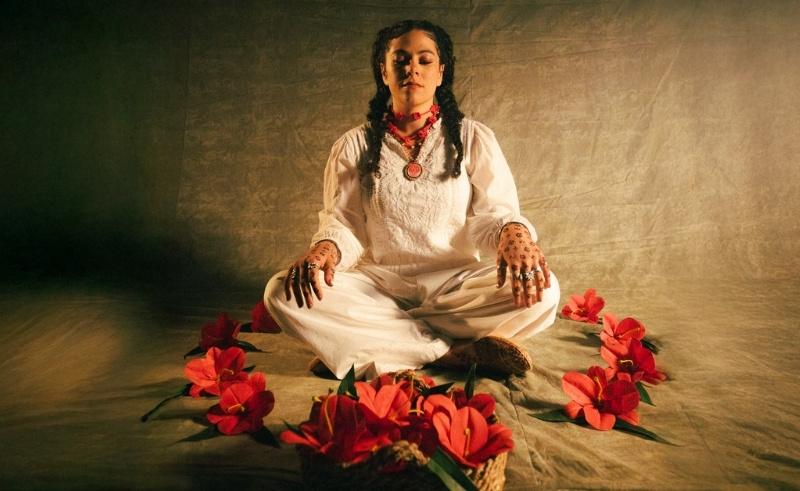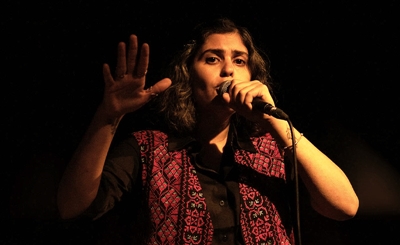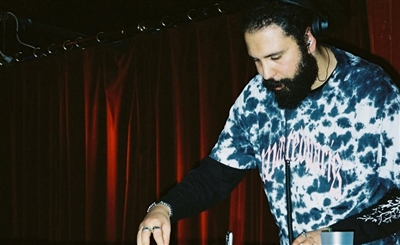Ma-Beyn’s Self-Titled Album is an Unruly Exploration of Arab Identity
Across 13 tracks, the Palestinian-Egyptian artist demonstrates her full potential and artistic range, crafting heirlooms in between the personal, social and political spheres.

Palestinian-Egyptian artist Ma-Beyn is a rebel with a cause. Always toeing with the peripheries of genres and crafting evocative lyricism like heirlooms that exist in the in-between the personal, social and political spheres. Her new self-titled debut album, which has been in the pipeline for over 14 months, is officially out, demonstrating her full artistic range and potential.
The album consists of 13 tracks, drawing from a mosaic of cultures, eras and influences that helped shape Ma-Beyn’s identity and upbringing into what she is today. Born from constant erasures, rewrites, and random bursts of inspirations as much as existential crises, the project serves as a living sonic dialogue between selfhood and Arab identity, stitching together elements from various musical styles, from R&B, rap and synth-pop to drum n bass, experimental, shaabi and boombap.
The record opens with a sampled vocal recording by Dina Elwedidi narrating, “مريم .. اسم طفلة فلسطينية كان ميالدها بالمخيم فرقة الشاطئ الفلسطينية”, against a distorted instrumental background - produced by Taymour Radwan and mastered by Kubbara - offering a glimpse of Ma-Beyn’s backstory and multi-cultural upbringing.
On tracks like ‘Ya Ghali’ and ‘Matafi’, previously released as preview singles of the album, the singer and rapper is in touch with her introspective, acoustic side, reflecting on her personal relationship. However, in contrast, songs like 'Bondoqia' and '7adoota' unapologetically confront pressing regional issues, especially the Palestinian cause.
'Bondoqia' reinterprets Nizar Qabbani’s classic, famously performed by Umm Kulthum, reaffirming a timeless message of resistance that remains relevant 50 years later. Meanwhile, '7adoota' features poignant sound bites from Ma-Beyn’s father and aunt - AKA the Shaath family, who helped her remain connected to her Palestinian roots though she never lived there - alongside references to Youssef Chahin’s cult-classic film, Mohamed Mounir’s '7adoota Masreya', as well as Mohamed Assaf’s ‘Dammi Falasteeni’. The track’s production, helmed by Kubbara, is a collage of distorted noises and glitches that mirror the track’s lyrical depth.
'Mateswash' is more of an old school rap cut, and a diss track to the Israeli colonisation. Then, 'Makan' comes as a smooth interlude with a contemplative tone. It’s here that Ma-Beyn takes us on her personal journey through processing her unruly experience, reaching a conclusion that what’s more important than aesthetic identity and representation is moral identity. She speaks of her ultimate purpose, singing "يا ربي اجعلني راملاية في شط السلام."
The album closes with ‘Ma3 Esalama', which was also released as a preview single, where Ma-Beyn embraces her multi-cultural Arab identity with all its diversity.
Despite its genre-hopping, Ma-Beyn’s self-titled debut is a cohesive, well-produced record that really reflects her unmistakable talent and evolving sound.
- Previous Article Select 345: Mixed by Nour Fahmy
- Next Article SceneNoise x Hiya Dialogues: Sabine Salamé
Trending This Week
-
Jul 27, 2025
-
Jul 25, 2025





















